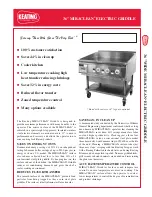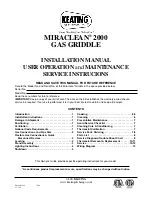
3
CAUTION:
To prevent personal injury or property damage, handle the temperature control carefully if you remove
it from the product immediately after cooking because the metal probe will be hot-do not touch the metal probe or let
it touch any thing or surface, which may burn.
CARE AND CLEANING
CAUTION:
To prevent personal injury or electric shock, always remove temperature control before immersing
griddle in water. Do not immerse temperature control, its cord or plug in water or other liquid.
1. Clean griddle thoroughly after each use. Do not immerse griddle in cold water when it is hot. Let griddle cool
completely, remove temperature control, then immerse griddle in hot, soapy water. Wipe temperature control
with a damp cloth if necessary.
2. Clean the non-stick surface of the griddle with hot soapy water, using a non-metal cleaning pad such as
Scrunge® scrubber sponge, Dobie® or Scotch-Brite Cookware Scrub ‘n Sponge®. A dishcloth or sponge may
give the non-stick surface a clean look, but will not remove the tiny food particles that can settle in the finish.
Do not use metal scouring pads or harsh scouring powders.
3. Clean the non-coated aluminum underside of the griddle with hot soapy water and a soap-filled steel wool
scouring pad. Remove stains with household cleanser. Remove burned-on grease with a special cleanser for
appliances such as Wantz™ Frypan and Grill Cleaner, Afta™ Fry Pan Cleaner, Whink™ Metal Cleaner or SS-
T® Metal Cleaner.
4. After washing, rinse griddle thoroughly with hot water and dry. If detergent is not entirely rinsed off interior and
exterior of griddle, it can result in stained areas when reheated.
5. Your griddle (with temperature control removed) may be cleaned in an automatic dishwasher. However, the
underside of griddle will discolor due to the minerals in water and the high heat of the drying cycle. This will
not affect the cooking ability of your griddle. Each time the griddle is cleaned in a dishwasher, the non-stick
surface should be reconditioned with cooking oil to ensure stick-free cooking.
SPECIAL CARE:
1. A spotted white film may form on the non-stick surface. This is a buildup of minerals from foods or water and is
not a defect in the surface. To remove, soak a soft cloth in lemon juice or vinegar and rub on finish. Wash the
non-stick surface thoroughly, rinse and dry. Recondition the non-stick surface with cooking oil.
2.
The non-stick surface may also become stained from improper cleaning or overheating. To remove stains, clean
the non-stick surface by the following method. Combine 1 cup of water and 1 tablespoon of ONE of the
following cleaners: Dip-It® coffee pot destainer, automatic dishwasher detergent or dry oxygen bleach crystals.
USE ONLY ONE OF THE ABOVE CLEANERS; DO NOT COMBINE.
Preheat griddle to 225º F. Wearing
rubber gloves, dip sponge into water mixture and wipe over surface.
Continue cleaning procedure until mixture is gone. Turn griddle OFF and allow to cool. Then remove
temperature control and scour the non-stick surface with hot soapy water and a non-metal scouring pad. Rinse
thoroughly and dry. Recondition the non–stick surface with cooking oil before using.
TEMPERATURE GUIDE
Allow griddle to preheat to temperature shown, unless otherwise noted. Griddle has reached desired temperature
setting when temperature control indicator light goes off. The quantities of food listed on the following pages are the
maximum amount that can be grilled at one time
FOOD TEMP
FOOD TEMP
FOOD TEMP
Bacon………..300ºF
Ham……….325ºF Sandwiches..375ºF
Eggs………….250ºF
Hamburgers.325ºF Sausage……300ºF
Fish……….….350ºF
Pancakes…..350ºF Steak………400ºF
Frankfurters….300ºF
Potatoes…...350ºF Warm/Serve..Warm/Simmer
French Toast…350ºF
Pork Chops..325ºF
TEMPERATURE
FOOD
SETTING
COMMENTS
BACON
300º F
Place bacon on cold griddle. Set heat at 300º F. Turn and
(up to 1 lb.)
separate as bacon cooks, or separate cold slices with tongs.

















